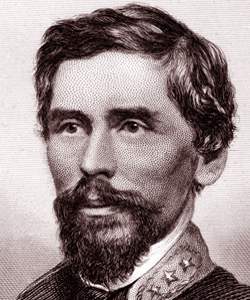Patrick Ronayne Cleburne (American National Biography)
Scholarship
Cleburne, however, is best remembered as the first prominent Confederate officer to advocate enlisting blacks in the army and rewarding them with emancipation. During the winter of 1863-1864 Cleburne circulated through the Army of Tennessee a proposal to use slaves as soldiers. It did not garner much support, but a copy was sent to Jefferson Davis.
What made Pat Cleburne willing to promote black freedom? Most likely, his Irish birth gave him a perspective different from that of his fellow Confederates. On the one hand, he believed that Confederate defeat would put the South in the same relationship to the North that Ireland had to Britain, and he was willing to sacrifice slavery to prevent that. He believed that the Confederate patriot should "give up the negro slave rather than be a slave himself." On the other hand, he had no doubts that an agrarian labor force could be exploited without the institution of slavery. Finally, despite more than a decade's residence in the southern United States, Cleburne had never owned a slave.
Cleburne's vision brought him little applause. Davis ordered his proposal suppressed. Cleburne received no preferment after filing his proposal--a case where a man's ideological unreliability overshadowed his undeniable competence.
What made Pat Cleburne willing to promote black freedom? Most likely, his Irish birth gave him a perspective different from that of his fellow Confederates. On the one hand, he believed that Confederate defeat would put the South in the same relationship to the North that Ireland had to Britain, and he was willing to sacrifice slavery to prevent that. He believed that the Confederate patriot should "give up the negro slave rather than be a slave himself." On the other hand, he had no doubts that an agrarian labor force could be exploited without the institution of slavery. Finally, despite more than a decade's residence in the southern United States, Cleburne had never owned a slave.
Cleburne's vision brought him little applause. Davis ordered his proposal suppressed. Cleburne received no preferment after filing his proposal--a case where a man's ideological unreliability overshadowed his undeniable competence.
Reid Mitchell, "Cleburne, Patrick Ronayne," American National Biography Online, February 2000, http://www.anb.org/articles/04/04-00241.html.



